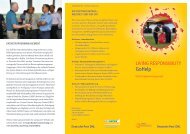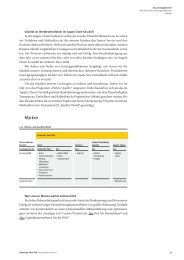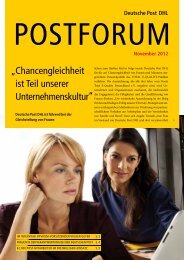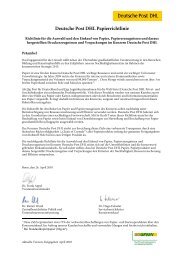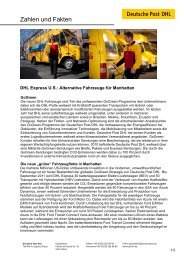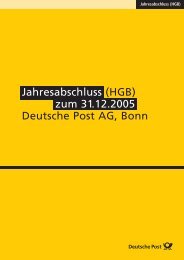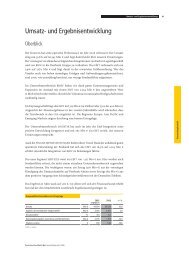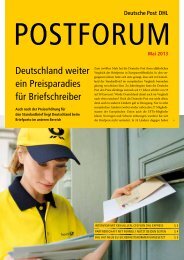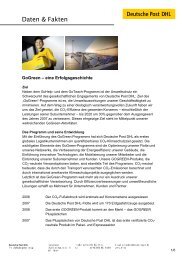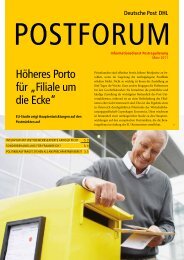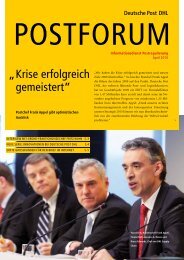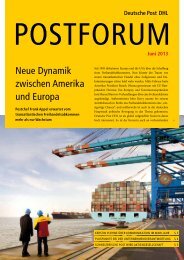Create successful ePaper yourself
Turn your PDF publications into a flip-book with our unique Google optimized e-Paper software.
Regulation of individual services<br />
The so-called regulation of individual services regulates<br />
our competitors’ use of <strong>Deutsche</strong> <strong>Post</strong>’s value-added<br />
chain. The extent to which we will be opening parts of<br />
our networks to our competitors and which costs they<br />
have to reimburse for this use are currently being clarified<br />
at the political level. Generally speaking, removing individual<br />
elements from the value-added chain could<br />
trigger a fall in the price of the remaining services.We are<br />
counteracting this risk with greater customer-orientation<br />
and measures to increase customer loyalty vis-à-vis<br />
our entire range of products and services.<br />
Competition for city mail delivery<br />
Competition for city mail delivery can be expected to<br />
grow even tougher as a consequence of the Regulatory<br />
Authority’s granting of licenses. We are responding to<br />
this situation with a customer-oriented price and product<br />
strategy and local solutions that are tailored to local<br />
needs.<br />
State aid proceedings<br />
In August 1999, the European Commission initiated<br />
proceedings against the Federal Republic of Germany<br />
under Article 88, Paragraph 2 of the EC Treaty in response<br />
to complaints lodged by United Parcel Service<br />
(UPS) and the Federal Association of International<br />
Express and Courier Services. In their complaints, our<br />
competitors maintain that <strong>Deutsche</strong> <strong>Post</strong> World Net<br />
received a sizable amount of illegal state subsidies from<br />
the Federal Republic of Germany. According to the<br />
complaints, these subsidies consisted primarily of:<br />
• Coverage of the losses generated over years in the parcel<br />
service area and cross-subsidization using funds<br />
from the revenues generated through the monopoly<br />
business in the letter mail segment.<br />
• Financing the acquisition of express and logistics<br />
companies using revenues from business activities<br />
in the monopoly area and through the sale of real<br />
estate which the German government transferred<br />
to <strong>Deutsche</strong> <strong>Post</strong> AG when it was founded in 1995.<br />
• The government’s assumption of the shortfalls in the<br />
<strong>Post</strong>al Retirement Fund for civil servants.<br />
The European Commission has informed the German<br />
government that under Article 14 of Council Ordinance<br />
No. 659 from 1999, recipients (in this case, <strong>Deutsche</strong><br />
<strong>Post</strong> World Net) must return all illegal subsidies.<br />
In an extensive statement to the European Commission,<br />
the German government rejected these accusations and<br />
explained why this was not a case of illegal subsidies.We<br />
expect the proceedings to be abandoned with the finding<br />
that there were no illegal subsidies and that<br />
<strong>Deutsche</strong> <strong>Post</strong> World Net is not obliged to return these<br />
funds. The European Commission is expected to issue<br />
its decision this summer.<br />
Price authorization<br />
The Regulatory Authority for Telecommunications and<br />
<strong>Post</strong> has to authorize the prices we charge for services<br />
falling under the exclusive license area. The authorization<br />
for our current prices expires on August 31, 2000.<br />
The Federal Ministry of Economics – to which the<br />
Regulatory Authority reports – recently stipulated that<br />
the current prices will apply through the year 2002.<br />
Discontinuation of the exclusive license<br />
New competitors will be able to enter the market when the<br />
exclusive license is discontinued on December 31, 2002<br />
and Germany’s postal market consequently opens up for<br />
further liberalization. Revenue could come under pressure<br />
from lower prices and smaller market shares if we are<br />
not able to compensate with greater market growth.<br />
An examination of the current risk situation indicates<br />
the absence of any risks which posed a threat to the<br />
Group’s existence during the 1999 business year and<br />
that no such risks are discernible for the future.<br />
Management Report<br />
31



